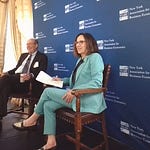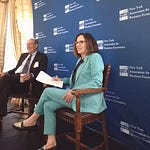When Martins Kazaks, a member of the European Central Bank Governing Council, joined me this week at the Spring Meetings of the IMF and World Bank, I congratulated him for his recent reappointment to a second term as Governor of the Bank of Latvia. He thanked me and wasted no time in getting to the issues being discussed here at the Spring Meetings
Mr. Kazaks stressed his commitment to running good monetary policy no matter what challenges exist. And his dedication to achieving the ECB’s 2% inflation target.
He also shared his optimism for Europe's future. We got to that part of the conversation by talking about the US-imposed tariffs and all the risks and uncertainty they raise for Latvia and all of Europpe. This, of course, is part of the changed relationship with the U.S. that has Europe in charge of its own security.
Mr Kazaks delivered a theme I had heard from others this week when he noted that these changes could be very good for Europe and force it to stand on its own and potentially develop more fully its own potential. He noted how Europe will be providing its own defense but it does not yet have a fiscal union which he believes it needs.
He also is looking at financial services and other areas he hopes Euroep would turn its attention to as it begins to bear more of its own burden for survival, and make progress to elevate its development. All in all this turn of events forced by the U.S., that at first may have looked punishing, may turn out to be a breath of fresh air for Europe. Mr Kazaks seems very optimistic on Europe's future
So dive in and hear what he has to say. Mr. Kazaks brings a seasoned central banker’s view to the table, in the context of a policy maker facing global challenges.
Objectives in a second term: Martins Kazaks 00:01:02:13
Well, of it is very clear in the law that the 2% medium term inflation that is the absolute goal. But of course there are many other things. And back home in Latvia. One is, of course, access to finance. You know how to improve the competition because the central bank is also the regulator, how to improve the supply of financial services to the public and all these relevant things with respect to the service that the financial industry provides. But of course, an important element in this geopolitical environment is also safety of the financial system, resilience to different types of crisis and all the related issues that are with everyday banking, issues like artificial intelligence, crypto and whatever else.
Russian asset seizure – a thorny problem 00:02:40:01
<Ukraine> is defending Europe as such and our values. So of course, it is extremely important to continue supporting Ukraine in its fight for freedom. And, you know, it costs money and Russian assets that have been frozen and in Europe are one potential source to finance Ukrainian’s ability to defend themselves. But this is not an issue to decide for central bankers. This is a political issue. So it's the politicians to decide. I think that it would be kind of a viable choice. But that is a decision of politicians, not of central bank governors to take.
Trump tariffs rake over Europe and raise uncertainty 00:04:06:20
Europe as such is very open economy. Exports are a big part of our growth engine and the clarity of the rules of the game. <Trade>, of course, is extremely important. So and what we currently see, is that uncertainty is very high and that the and the game and the end outcome of this tariff war is still very uncertain.
Heightened risk AND uncertainty 00:04:43:05
<The potential> dislocations are so big, the of course the hit to the economy is negative and we'll see how it all plays out. But I would say that yes, we have seen quite significant downgrades in growth rates and we also see the IMF downgrading growth for the global economy. But given the very high uncertainty, given that it's not only the trade dislocation, but it is uncertainty, the uncertainty itself, which delays consumption, would delay investments, I would say that the risk of recession, of course, is not trivial.
A falling tide lowers all boats 00:05:43:10
Well, our direct linkages with the US are not that big, but we are indirectly affected quite a lot too, because Germany or for instance, Finland, which are heavily open to the U.S. trade, are important trade partners of ours. So I think if we talk about Europe, Europe, by and large, it is in the same boat. So everybody will be affected through the trade dislocations, somebody more, somebody less. And it, of course, is uncertain at the moment because there are some trade talks that have started, some trade. Those have not started at all. It's not really clear yet how broad tariffs are going to be, what kind of goods they are going to include, what are not. So, you know, currently it is super uncertain.
Russia trade is no more…00:06:39:11
Russia used to be - used to be - no longer large. In terms of exports a bit is still there, but in terms of imports, of course our major import item was energy and we are not importing by and large anything from Russia anymore. LNG in more than 80% is from the US, the rest from Norway.
Investing in a safer future- 00:07:57:07
And of course we value it very highly. We are part of NATO, we are part of the European Union, we are part of euro area. And our aim is to be part of the Western world. But of course we are investing heavily over the past years into our defense. This year we are spending and I would say it's not spending, it's investment. We are investing close to 4% of GDP in defense and next year we are going to more to close to 5% of GDP for defense. But of course, this is a group effort. So similar numbers we will see in Poland and other Baltic countries, Estonia, Lithuania, we also see Finns and Swedes ramping up their defense investment. And we also see other European countries, Spain for that matter, which has been spending on defense, quite little significant to less than the 2% minimum requirement for NATO is going to move very quickly, as we can see, to 2% already next year.
Europe waking up – and it is good news 00:09:35:17
I'm very happy to see Europe is waking up and taking care of its own, of its own defense and not relying that much on <the US> in certain cases. I would even say that in the past, Europe was free riding on the US defense. Now it's not the case anymore. And I think this is really good news. And given the high uncertainty, given the relocations, I think the external push for Europe is finally to assert itself as as a geopolitical superpower. This is a good chance, the good opportunity that Europe has to make to strengthen its economy, to strengthen its defense, and to stand for itself. Well, you know, there's a question
A fundamental failure to understand Russia 00:10:34:10
…just listen to what Putin has been saying since 2007, and that is the plan that he is following out. And there is still much talk on the western part and too little action. We saw what happened in Georgia in 2008. We saw what happened in Ukraine in 2014… 2022 Ukraine was really a wakeup call. But still, the West is quite hesitant and think that, well, it's possible to talk Russia into slowing and calming down. I don't think it's possible. The only thing that you can demonstrate is force. And we have to be as the West Europe, for that matter, especially strong- strong enough to create a situation that the Russians sees that it's not worth trying.
Ukraine must be the stopping point 00:11:40:08
If Russians don't stop in Ukraine, they will never stop themselves. They have to be stopped. If we don't stop them in Ukraine, they will venture further and that is into areas we see, for instance, in the same situation currently in the Baltics. Of course, there is no open war, but there are cyberattacks all the time. You know, that's a daily issue.
NATO is essential; membership was not forced on anyone 00:13:26:
But, you know, let's not be naive, okay? Russia is a revisionist power. It has imperialistic leanings and it is extremely clearly seen not only from the Baltics, but from all of Europe. And none of the countries- and my own country as well- that joined the NATO were talked into this by the US or any other country. It was our own will to join the NATO to get protection from Russia and take a look at the famous Swedes. Until 2022, it was close to undeniable that they would ever join the NATO's and well, they did very quickly. And this is not because the US or anybody else said <so>. So that was their own wish.
Europe still does not have a fiscal union 00:15:29:01
So we have a monetary union and at the same time, the European institutional architecture was very much improved after the 2009 global financial crisis and thereafter the the sovereign financial crisis. But it is not yet complete. We have a monetary union, we don't have fiscal union. We have single by and large, single market in goods, but single market and services, especially financial services as well, is still very, very fragmented. So we have not we are even not close to realizing all the internal low hanging or higher hanging fruits to boost our economies. So we need structural reforms and there have been two fantastic papers over the last year, one by my Draghi, the other one by letter saying very clearly what Europe needs to done to do what needs to be done to improve its structural efficiency, how to make European economy stronger.
More unfinished business for Europe 00:17:10:00
So from the monetary policy perspective, we would benefit as union and our economies will become much, much stronger if all those structural things like capital markets, union, like banking union, would be completed. All right. Well, I hope they're listening well, and I hope they do At the end of the day, of course, Europe being a stronger economy and politically more united, of course, will be also a better partner to the US.
MĀRTIŅŠ KAZĀKS
On 12 December 2019 the Saeima of the Republic of Latvia appointed Mārtiņš Kazāks Governor of Latvijas Banka for a term of five years (the new term of office commenced on 21 December 2019).
Mārtiņš Kazāks was born on 19 September 1973 in Liepāja. He is a graduate of Liepāja Rainis Secondary School No. 6 (1991) and holds a BSc in Economics from the University of Latvia (1995), a Diploma in Economics from the University of Cambridge (1996), an MSc in Economics(with Distinction; 1997) and a PhD in Economics (2005) from the University of London.
In 1994–1995, he was Leading Economist in the Department of Macrofiscal Analysis and Forecast of the Ministry of Finance of the Republic of Latvia and Research Assistant at the Riga Office of the International Research and Exchanges Board. Between September 2000 and June 2001 and from September 2001 to June 2002, he served as Honorary Research Assistant at the Social Sciences Department, School of Slavonic and East European Studies, University College London.
Between November 2005 and December 2009, he worked as Chief Economist at AS "HANSABANKA" (subsequently renamed "Swedbank" AS) and Baltic Banking Chief Macro Analyst at the Hansabank Group. From January 2010 to August 2018, he was Deputy Chief Economist of the Swedbank Group, Chief Economist of Swedbank Latvia and Head of Macro Research Baltics of the Swedbank Group. On 21 June 2018, the Saeima of the Republic of Latvia appointed Mārtiņš Kazāks Member of the Council of Latvijas Banka as of 1 August 2018. Mārtiņš Kazāks has lectured at the Stockholm School of Economics in Riga (1996–2008), the University of London, Riga Stradiņš University and Riga Business School.
He has been a member of the following bodies: the Strategic Analysis Committee of the President of Latvia (2006–2011), Counselor Convention of BA School of Business and Finance, Counselor Convention of Liepāja University and Fiscal Discipline Council of the Republic of Latvia (2014–2018). He is a member of the Economists Association 2010 and National Association for Business Economics (USA). Mārtiņš Kazāks has authored and co-authored numerous publications in the fields of financial markets and their integration, the economic development cycle and financial crises, fiscal policy and competitiveness of the economy.
In his capacity as Governor of Latvijas Banka, Mārtiņš Kazāks is a Member of the Governing Council of the European Central Bank and the General Council of the European Central Bank. Mārtiņš Kazāks is the Governor of the International Monetary Fund for the Republic of Latvia.













Share this post